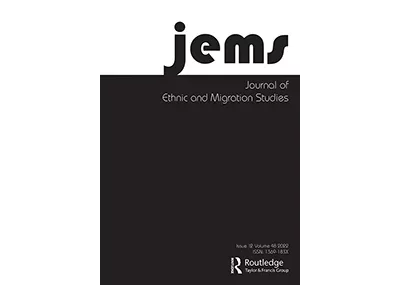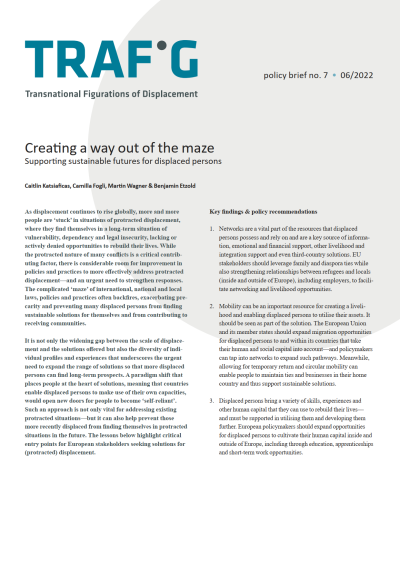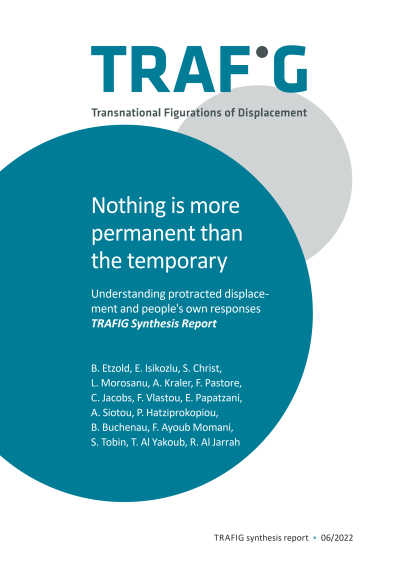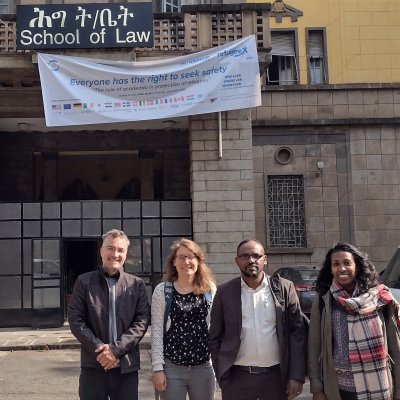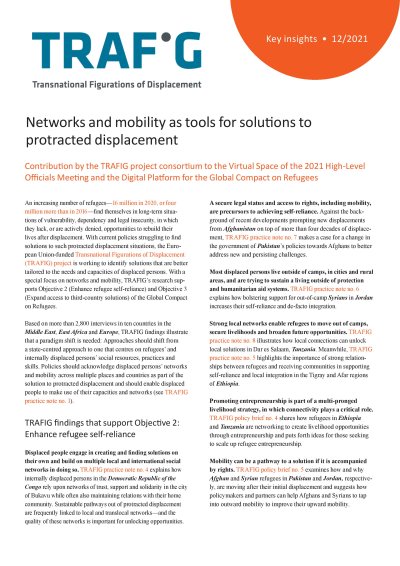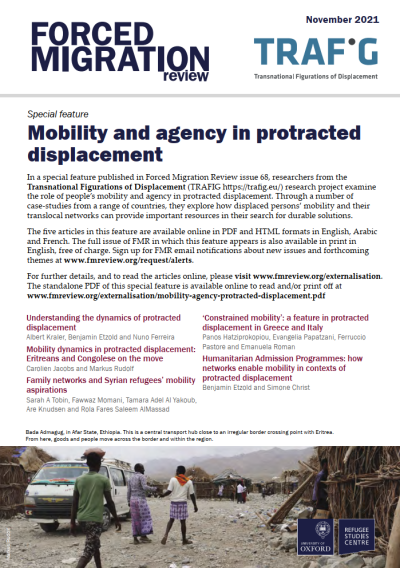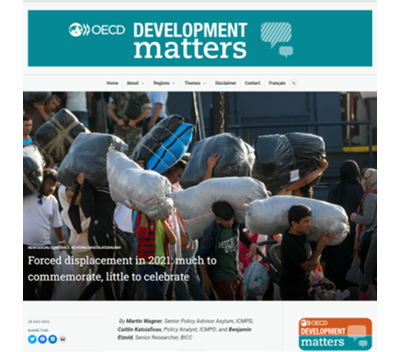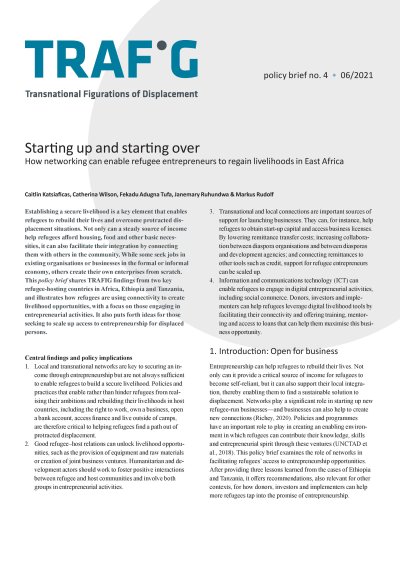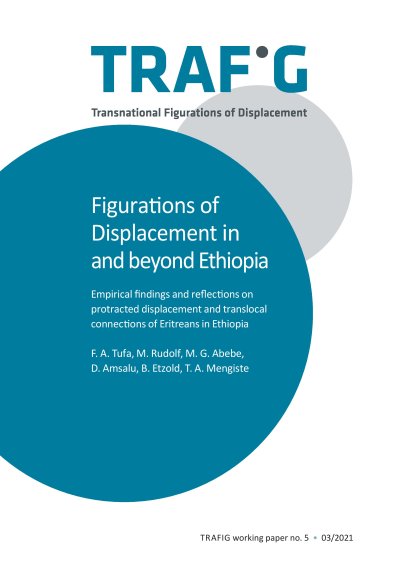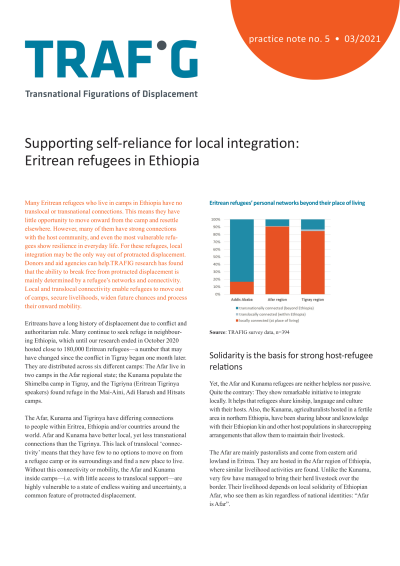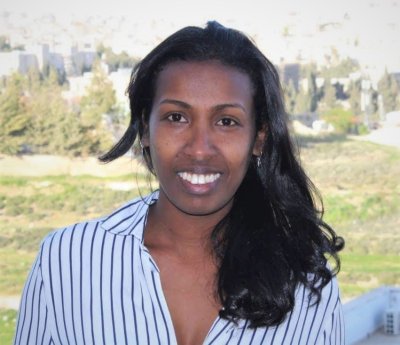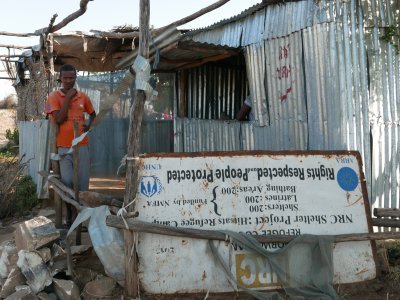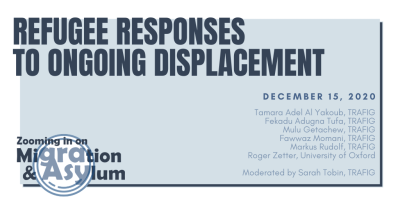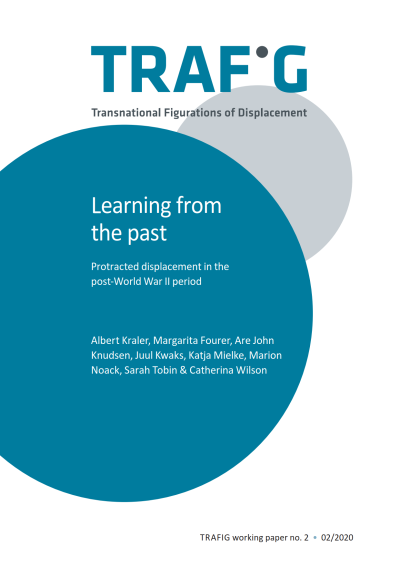Ethiopia
Researchers from Addis Ababa University and BICC (Bonn International Centre of Conflict Studies) investigated the conditions of Eritrean refugees in Ethiopia together. More than 600 people participated in their study in Tigray and Afar Regions as well as in Addis Ababa.
Special Issue in JEMS
Unsettling Protracted Displacement: Connectivity and Mobility beyond Limbo
Key results and reflections from the TRAFIG project have just been published in a special issue in the Journal of Ethnic and Migration Studies (JEMS).
The 9 contributions present novel insights of empirical research in African, Asian and European countries on the role of connectivity and mobility in the lives of displaced people, they critically engage with policies, legal frameworks and structures that keep displaced people in an ongoing state of limbo, they reflect upon the concept of protracted displacement and seek to advance its understanding, and they employ a figurational approach in their analysis.
All 9 articles are freely accessible via the publishers website: Read more
1 Introduction: Unsettling Protr
...TRAFIG policy brief no. 7
Creating a way out of the maze: Supporting sustainable futures for displaced persons
As displacement continues to rise globally, more and more people are ‘stuck’ in situations of protracted displacement, where they find themselves in a long-term situation of vulnerability, dependency and legal insecurity, lacking or actively denied opportunities to rebuild their lives. Drawing lessons from more than 3 years of research, this policy brief highlights critical entry points for European stakeholders seeking solutions for (protracted) displacement. Read more
TRAFIG Synthesis report
'Nothing is more permanent than the temporary' – Understanding protracted displacement and people's own responses
Final report sums up findings of 3 1/2 years of TRAFIG research.
Across the world, 16 million refugees and an unknown number of internally displaced persons (IDPs) experience long-lasting conditions of economic precarity, marginalization, rightlessness and future uncertainty. They live under conditions of protracted displacement. Policy solutions often fail to recognise displaced people’s needs and limit rather than widen the range of available solutions.
This report brings together the central findings of the TRAFIG project’s empirical study in the Democratic Republic of the Congo (DRC), Ethiopia, Tanzania, Jordan, Pakistan, Greece, Italy and Germany. We... Read more
Researchers' meetings and outreach activities in Ethiopia
Around Refugee Week 2022, TRAFIG researchers met in Addis Ababa, Ethiopia, to compare and discuss insights from empirial research and to disseminate key research findings to various stakeholders.
On 23 June, the Faculty of Law of Addis Ababa University organized a conference in the framework of World Refugee Week. The conference ‘Everyone has the right to seek safety - The role of academia in the protection of refugees’ was attended by policy makers, practitioners, academics, and refugees. Fekadu Adugna and Markus Rudolf presented key findings of their joint TRAFIG research in Ethiopia. (see the conference program)
From 22-24 June, TRAFIG team members Fekadu Tufa, Mulu Getachew and Desalegn Amsalu (AAU, Ethiopia), Markus Rudolf (BICC) and Carolien Jacobs (Leiden University) organiz... Read more
TRAFIG at the “In Dialogue” Symposium organised by Indiana University
On 18/19 March 2022, colleagues involved in the TRAFIG project contribute to Indiana University’s “In Dialogue” Symposium, which focusses on transnational dynamics and repercussions of the movement of displaced peoples between Africa and Europe. In a session on “Constrained transnationalism: Experiences of displacement and ongoing limbo between Africa and Europe” Catherina Wilson (Leiden University), Janemary Ruhundwa (Dignity Kwanza), Benjamin Etzold (BICC), Markus Rudolf (BICC), Simone Christ (formerly BICC) and Pietro Cingolani (FIERI) will share insights from TRAFIG research in Tanzania, Ethiopia, Italy, the Netherlands and Germany.
Networks and mobility as tools for solutions to protracted displacement
Contribution by the TRAFIG project consortium to the Virtual Space of the 2021 High-Level Officials Meeting and the Digital Platform for the Global Compact on Refugees
An increasing number of refugees – 16 million in 2020, or 4 million more than in 2016 – find themselves in long-term situations of vulnerability, dependency and legal insecurity, in which they lack, or are actively denied, opportunities to rebuild their lives after displacement. With current policies struggling to find solutions to such protracted displacement situations, TRAFIG is working to identify solutions that are better tailored to the needs and capacities of displaced persons. With a special focus on networks and mobility, TRAFIG’s research supports Objective 2 (Enhance refugee self-reliance) and Objective 3 (... Read more
Mobility and agency in protracted displacement
Available in English, French and Arabic
The latest issue of the Forced Migration Review includes a special feature on mobility and agency for those living in protracted displacement, produced in collaboration with the TRAFIG project. Read more
- Understanding the dynamics of protracted displacement
- Mobility dynamics in protracted displacement: Eritreans and Congolese on the move
- Family networks and Syrian refugees’ mobility aspirations
- ‘Constrained mobility’: a feature in protracted displacement in Greece and Italy
- Humanitarian Admission Programmes: how networks enable mobility in contexts of protracted displacement
Forced displacement in 2021: much to commemorate, little to celebrate
Published in the OECD Blog series 'Development matters'
It is primarily the responsibility of states to provide durable solutions to people in protracted displacement. A state-centred approach, however, risk underestimating or even disregarding the ambitions and capacities of displaced people themselves. In a contribution to the OECD blog series ‘Development matters’ Martin Wagner and Caitlin Katsiaficas (both ICMPD) and Benjamin Etzold (BICC) present some insights on TRAFIG research on the mobility of displaced people in the Middle East and East Africa and the role of networks in their everyday lives. They conclude that many refugees rely first and foremost on their own human, social and financial capital to build a more secure future.
Find the article here: Forced displaceme... Read more
TRAFIG policy brief no. 4
Starting up and starting over
How networking can enable refugee entrepreneurs to regain livelihoods in East Africa
Establishing a secure livelihood is a key element that enables refugees to rebuild their lives and overcome protracted dis placement situations. Not only can a steady source of income help refugees afford housing, food and other basic neces sities, it can also facilitate their integration by connecting them with others in the community. While some seek jobs in existing organisations or businesses in the formal or informal economy, others create their own enterprises from scratch.
This policy brief shares TRAFIG findings from two key refugee-hosting countries in Africa, Ethiopia and Tanzania, and illustrates how refugees are using connectivity to create livelihood oppor... Read more
TRAFIG working paper no. 5
Figurations of Displacement in and beyond Ethiopia
Empirical findings and reflections on protracted displacement and translocal connections of Eritreans in Ethiopia
This working paper is based on empirical research on translocal figurations of displacement in Ethiopia. It explores TRAFIG’s central question: “How are protractedness, dependency and vulnerability related to the factors of local and translocal connectivity and mobility, and, in turn, how can connectivity and mobility be utilised to enhance the self-reliance and strengthen the resilience of displaced people?” The paper presents findings from six camps in Tigray and Afar regional states, as well as urban refugees in Addis Ababa and several cities in Tigray.
The findings show that the capability to break free from protr... Read more
TRAFIG practice note no. 5
Supporting self-reliance for local integration
Eritrean refugees in Ethiopia
Many Eritrean refugees who live in camps in Ethiopia have no translocal or transnational connections. This means they have little opportunity to move onward from the camp and resettle elsewhere. However, many of them have strong connections with the host community, and even the most vulnerable refugees show resilience in everyday life. For these refugees, local integration may be the only way out of protracted displacement. Donors and aid agencies can help.TRAFIG research has found that the ability to break free from protracted displacement is mainly determined by a refugee’s networks and connectivity. Local and translocal connectivity enable refugees to move out of camps, secure livelihoods, widen future chan... Read more
Meet TRAFIG Team member Mulu Getachew Abebe from Addis Ababa University
Meet Mulu Getachew Abebe - a member of the TRAFIG research team at the Addis Ababa University, Ethiopia - and find out more about her experience, her motivation and her work in the TRAFIG project.
My name is Mulu Getachew Abebe. I am a PhD candidate in Social Anthropology at Addis Ababa University, where I also did my M.A. I am interested in the broad field of migration and refugee studies, covering the various aspects of social, cultural and political life that affect refugees’ experiences. My work focuses on trans-border migration of Eritrean refugees across the Ethiopian-Eritrean border. Before my admission to the PhD Program, I was working as a social worker in a nongovernmental organization, which tried to raise awareness on risks of human trafficking. We created socio-economic op... Read more
Eritrean refugees in Ethiopia—Caught between all fronts
By Markus Rudolf
Background
Forced displacement in Ethiopia is a complex issue with, in part, contradictory trends. In 2018, when the Eritrean–Ethiopian peace agreement laid the foundation for opening borders and the Nobel Peace Prize, between one and three million people were displaced by inter-ethnic conflicts and violence in Ethiopia. At the same time, just one country in Africa, Uganda, is sheltering more refugees than Ethiopia does. According to UNHCR, 800,000 refugees and asylum seekers were registered in 2020, including just under 22,000 in the capital Addis Ababa (75 per cent Eritreans). They all profited from the relaxation of the once strict encampment policy in Ethiopia.
Current situation
While the eyes of the world were on the US Presidential elections, an armed co... Read more
#6: Refugee responses to ongoing displacement
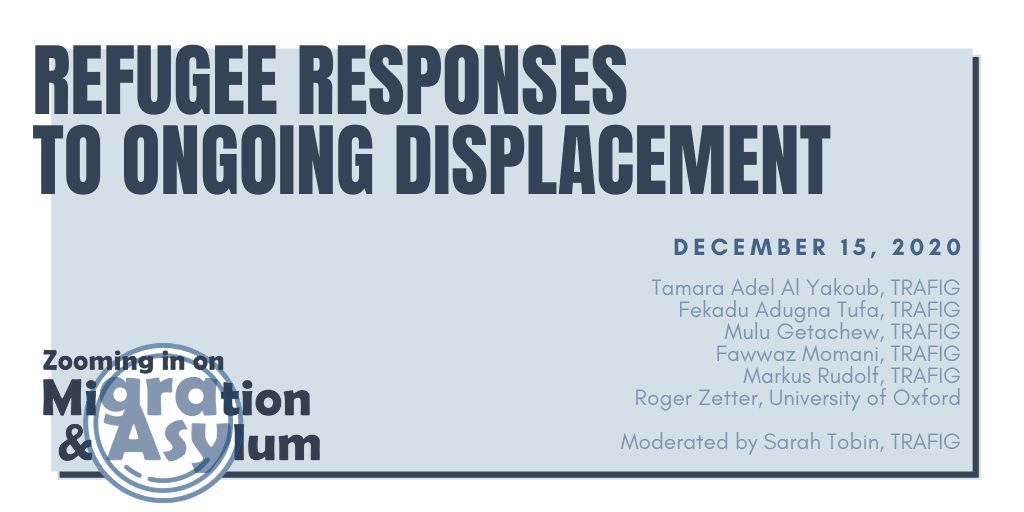
15 December 2020, 13:00 - 14:30 CET
With continued record levels of displacement across the globe, solutions in the true sense of the word remain elusive for many. This webinar will explore different strategies that refugees and IDPs are using to respond to displacement-related challenges. Speakers will highlight examples of solutions found by those who are displaced themselves, based on field research in Ethiopia and Jordan. These often go beyond those commonly recognised, including strategies related to TRAFIG’s themes of connectivity and mobility. Speakers will also examine the global need for durable solutions and check in on the Global Compacts two years after their signing.
Facilitator: Transnational Figurations of Displacement (TRAFIG)
Framing remarks Read more
- Roger Zetter,...
TRAFIG working paper no. 2
Learning from the past
Protracted displacement in the post-World War II period
This working paper examines the history of the search for solutions to protracted displacement. Focusing specifically on the Horn of Africa, East Africa, the Middle East and South Asia, the paper analyses past policy responses that explicitly or implicitly address situations of extended exile. In addition, the paper examines the potential of translocal mobility and connectivity as an individual- or household-level solution to displacement.
The concern to find solutions for long-term displacement situations has been a key driver for the evolution of the international refugee protection regime ever since its initiation in the interwar period. Yet, only more recently have these efforts crystallised around... Read more

